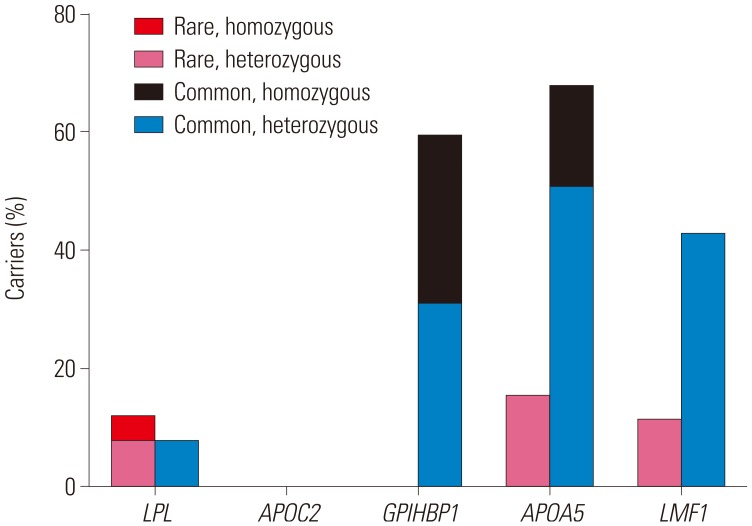Yonsei Med J.
2018 Jan;59(1):148-153. 10.3349/ymj.2018.59.1.148.
Variants of Lipolysis-Related Genes in Korean Patients with Very High Triglycerides
- Affiliations
-
- 1Division of Cardiology, Department of Internal Medicine, Severance Hospital, Yonsei University College of Medicine, Seoul, Korea. shl1106@yuhs.ac
- 2Cardiovascular Research Institute, Yonsei University College of Medicine, Seoul, Korea.
- 3Department of Biostatistics and Computing, The Graduate School, Yonsei University, Seoul, Korea.
- 4Department of Medicine, Graduate School, Kyung Hee University, Seoul, Korea.
- 5Department of Clinical Pharmacology and Therapeutics, College of Medicine, Kyung Hee University, Seoul, Korea. hyunihyuni@khu.ac.kr
- KMID: 2418862
- DOI: http://doi.org/10.3349/ymj.2018.59.1.148
Abstract
- We investigated the prevalence and characteristics of variants of five lipolysis-related genes in Korean patients with very high triglycerides (TGs). Twenty-six patients with TG levels >885 mg/dL were selected from 13545 Korean subjects. Five candidate genes, LPL, APOC2, GPIHBP1, APOA5, and LMF1, were sequenced by targeted next-generation sequencing. Predictions of functional effects were performed and matched against public databases of variants. Ten rare variants of three genes were found in nine (34.6%) patients (three in LPL, four in APOA5, and three in LMF1). Five were novel and all variants were suspected of being disease-causing. Nine were heterozygous, and one (3.8%) had a homozygous rare variant of LPL. Six common variants of four genes were observed in 25 (96.2%) patients (one in LPL, one in GPIHBP1, two in APOA5, and two in LMF1). The c.G41T variant of GPIHBP1 and c.G533T variant of APOA5 were most frequent and found in 15 (57.7%) and 14 (53.8%) patients, respectively. Rare homozygous variants of the genes were very uncommon, while diverse rare heterozygous variants were commonly identified. Taken together, most study subjects may be manifesting the combined effects of rare heterozygous variants and common variants.
Keyword
MeSH Terms
Figure
Cited by 1 articles
-
Role of Genetics in Preventive Cardiology: Focused on Dyslipidemia
Sang-Hak Lee
Korean Circ J. 2021;51(11):899-907. doi: 10.4070/kcj.2021.0239.
Reference
-
1. Gaudet D, Brisson D, Tremblay K, Alexander VJ, Singleton W, Hughes SG, et al. Targeting APOC3 in the familial chylomicronemia syndrome. N Engl J Med. 2014; 371:2200–2206. PMID: 25470695.
Article2. Gotoda T, Shirai K, Ohta T, Kobayashi J, Yokoyama S, Oikawa S, et al. Diagnosis and management of type I and type V hyperlipoproteinemia. J Atheroscler Thromb. 2012; 19:1–12. PMID: 22129523.
Article3. Chiou KR, Chen CY, Charng MJ. Genetic diagnosis via whole exome sequencing in Taiwanese patients with hypertriglyceridemia. J Atheroscler Thromb. 2015; 22:887–900. PMID: 25843152.
Article4. Khovidhunkit W, Charoen S, Kiateprungvej A, Chartyingcharoen P, Muanpetch S, Plengpanich W. Rare and common variants in LPL and APOA5 in Thai subjects with severe hypertriglyceridemia: A resequencing approach. J Clin Lipidol. 2016; 10:505–511. PMID: 27206937.
Article5. Maruyama T, Yamashita S, Matsuzawa Y, Bujo H, Takahashi K, Saito Y, et al. Mutations in Japanese subjects with primary hyperlipidemia-results from the Research Committee of the Ministry of Health and Welfare of Japan since 1996? J Atheroscler Thromb. 2004; 11:131–145. PMID: 15256764.6. Ríos-González BE, Luévano-Ortega KE, Saldaña-Cruz AM, González-García JR, Magaña-Torres MT. Polymorphisms of seven genes involved in lipid metabolism in an unselected Mexican population. J Genet. 2011; 90:e114–e119. PMID: 22232194.
Article7. Charrière S, Peretti N, Bernard S, Di Filippo M, Sassolas A, Merlin M, et al. GPIHBP1 C89F neomutation and hydrophobic C-terminal domain G175R mutation in two pedigrees with severe hyperchylomicronemia. J Clin Endocrinol Metab. 2011; 96:E1675–E1679. PMID: 21816778.
Article8. Yamamoto H, Onishi M, Miyamoto N, Oki R, Ueda H, Ishigami M, et al. Novel combined GPIHBP1 mutations in a patient with hypertriglyceridemia associated with CAD. J Atheroscler Thromb. 2013; 20:777–784. PMID: 23831619.
Article9. Pullinger CR, Aouizerat BE, Movsesyan I, Durlach V, Sijbrands EJ, Nakajima K, et al. An apolipoprotein A-V gene SNP is associated with marked hypertriglyceridemia among Asian-American patients. J Lipid Res. 2008; 49:1846–1854. PMID: 18441017.
Article10. Evans D, Aberle J, Beil FU. Resequencing the apolipoprotein A5 (APOA5) gene in patients with various forms of hypertriglyceridemia. Atherosclerosis. 2011; 219:715–720. PMID: 21993410.
Article11. Johansen CT, Hegele RA. Allelic and phenotypic spectrum of plasma triglycerides. Biochim Biophys Acta. 2012; 1821:833–842. PMID: 22033228.
Article12. Surendran RP, Visser ME, Heemelaar S, Wang J, Peter J, Defesche JC, et al. Mutations in LPL, APOC2, APOA5, GPIHBP1 and LMF1 in patients with severe hypertriglyceridaemia. J Intern Med. 2012; 272:185–196. PMID: 22239554.13. Rabacchi C, Pisciotta L, Cefalù AB, Noto D, Fresa R, Tarugi P, et al. Spectrum of mutations of the LPL gene identified in Italy in patients with severe hypertriglyceridemia. Atherosclerosis. 2015; 241:79–86. PMID: 25966443.
Article14. Wang J, Cao H, Ban MR, Kennedy BA, Zhu S, Anand S, et al. Resequencing genomic DNA of patients with severe hypertriglyceridemia (MIM 144650). Arterioscler Thromb Vasc Biol. 2007; 27:2450–2455. PMID: 17717288.
Article15. Kathiresan S, Melander O, Guiducci C, Surti A, Burtt NP, Rieder MJ, et al. Six new loci associated with blood low-density lipoprotein cholesterol, high-density lipoprotein cholesterol or triglycerides in humans. Nat Genet. 2008; 40:189–197. PMID: 18193044.
Article16. Ramasamy I. Update on the molecular biology of dyslipidemias. Clin Chim Acta. 2016; 454:143–185. PMID: 26546829.
Article17. Martín-Campos JM, Julve J, Roig R, Martínez S, Errico TL, Martínez-Couselo S, et al. Molecular analysis of chylomicronemia in a clinical laboratory setting: diagnosis of 13 cases of lipoprotein lipase deficiency. Clin Chim Acta. 2014; 429:61–68. PMID: 24291057.
Article
- Full Text Links
- Actions
-
Cited
- CITED
-
- Close
- Share
- Similar articles
-
- Utility of Next-Generation Sequencing Panel Including Hereditary Breast and Ovarian Cancer-Related Genes for Pathogenic Variant Detection
- Effects of fermented blueberry liquid in high-fat diet-induced obese C57BL/6J mice
- Large Edematous Purpuric Plaques after Lipolysis Acupuncture
- Fumigaclavine C attenuates adipogenesis in 3T3-L1 adipocytes and ameliorates lipid accumulation in high-fat diet-induced obese mice
- AnsNGS: An Annotation System to Sequence Variations of Next Generation Sequencing Data for Disease-Related Phenotypes


